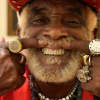This week's FADER mix comes from the legendary Adrian Sherwood, the English pioneer of dub and zonked-out production. Sherwood just released the supremely heavy Survival & Resistance, his third album under his own name, via On-U Sound, the label he founded in the early ’80s, and his mix traces its beginnings in transcendental roots reggae. Download the mix below, followed by an interview on production technique, running a label and Lee Perry lighting someone's sock on fire.
Download: Adrian Sherwood's FADER Mix
Early in your production career, you hummed bass lines for people to play. Did you ever learned proper notation and the keys of music? No.
Has that hindered you? Not really. I know, F A C E E G B D F—I know what that is. The thing is, I’ve never pretended to be a great musician. I’ve worked with great musicians, and what I find is that very often it’s not the best musicians that make the best music. It’s about ideas, vibe, fragility, subtly and little bits of mistakes and charm. I’m consciously making sure the stuff I do is not too polished, because if you went with great, great, great musicians, who were brilliant, it almost sounds like a machine playing, it’s that good. For me I’m not at all ashamed of how I am. I think I’m good at conveying what I want and experimenting with sound in a way that is my own style. I don’t inspire to be a musician, to be honest.
So do you consider yourself to be an ideas man? Or are you just good at making accidents? I think I’ve grown into a few things that I wasn’t when I started. When I started I just did my first recordings for fun, which I think is what you should do. You should do anything because you love it. I kind of landed my way into recording studios—that’s when I did what you described, humming basslines with somebody and made the first album. But as the years have gone on, and you put in literally tens of thousands of hours in a creative environment involving equalization, phasing and mixing decks, you learn things that only experience can teach you. I learned a lot with working with the likes of Lee Perry or Mark Stewart and Mark Smith of The Fall, different approaches that are invaluable when dealing with what they call mad management in sports. Lee Perry taught me—one great thing I learned from him is that if he would have been in the studio and there are people in the room—I've seen him set fire to somebody’s sock while they were asleep in the studio. He put a lighter on their toe because they were falling to sleep. Then he ejected them from the studio and cussed them out. He’s a lot older now, but he still believes that if you’re going into the studio you got to believe you are doing something magic. So he would light candles, do all sorts of little things. What he’s trying to do is tell himself and everybody else in the room that, hey, there’s something special is gonna happen here.
Did you record you new album analog? I’m a big fan of tape but I didn’t record it analog, I mixed it analog. I recorded it digitally and mixed it analog, but I’ve been using a lot of vintage mics and I always mix with my fingers using an analog desk. I look at the picture like a sound. Like the hi-hats up in the air, the snares smacking your forehead, the foot drums underneath your testicles, that kind of thing. I like it when it’s moving around the room and you think something is behind your head, exploding in the distance, and you can do that really spontaneously with analog. I tend to use certain delay speeds, reverbs, plugging a reverb into a phaser, mixing things backwards, turning the mix over, and things like that to make a kinda really interesting sonic picture. You can almost do a performance, which is what classic dub mixing is. That’s what I’ve always loved. By being the producer, dub mixer, whatever, you’re shaping something to the final execution of the mix, not just sitting back minusculely making it perfect with a computer, but it’s attacking the bloody thing and, you know, making it leap out at you with your fingers. That adds a big life to the end of it, when you push it off.
What advice do you have for young labels? Well the label has been successful aesthetically; it’s not been successful financially. I’ve poured loads of my own money to keep the label going. It’s a labor of love. I would say to anybody if you are running a label, if you are trying to run it as a financial business, I would advise you not to do it. But running a label is a great thing to do. It’s like a calling card and it’s also something you can create a little scene around. I’m fiercely proud of it and I’ve protected it because I kept thinking we would sell ten times more than we ever did, but it’s turned around that we’ve got respect, which is worth a lot more than the money. A lot of fantastically rich musicians wish people respected them. So my advice to anybody starting out is you’ve just got to do as much as you can while you can and you’re motivated but you’ve also got to try your own sound. There’s no point just pressing the wub-wub dubstep button on the stuff. Working with analog, working with different approaches, you stand out from the pack is the key to survival, and obviously make good songs.
